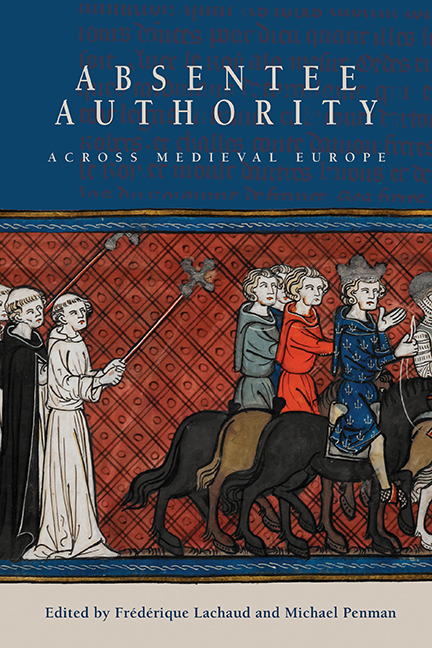Book contents
- Frontmatter
- Contents
- List of Illustrations
- List of Contributors
- Acknowledgements
- List of Abbreviations
- Introduction: Absentee Authority across Medieval Europe
- 1 Incarnating Authority, Exercising Authority: The Figure of the King in the Merovingian Era
- 2 ‘Ubi armae ibi princeps’: Medieval Emblematics as the Real Presence of the Prince
- 3 While the Bishop's Away …: Absentee Bishops of Parma during the Investiture Contest
- 4 An Inconceivable Absence: Usurpers and Illegitimate Rulers in the Genealogical Rolls of the Kings of England, from the Late Thirteenth to the Early Fifteenth Centuries
- 5 Local Loyalty and Absentee Authority in Thirteenth-Century Normandy: The Evidence of the Querimoniae Normannorum (1247)
- 6 Representation and Authority in Thirteenth-Century England and Gascony
- 7 Internal Exiles: Exclusion from the Fourteenth-Century English Court and Kingdom
- 8 ‘Si grant charté a Paris … par defaulté du roy’: Governmental Practice and the Customary Geography of the Absence and Presence of the King in France (1364–1525)
- 9 Was the Couple a Palliative to the Absence of the Prince? The Political Role and Influence of Margaret of Flanders during the Reign of Philip the Bold, Duke and Count of Burgundy (1384–1404)
- 10 Guardian – Lieutenant – Governor: Absentee Monarchy and Proxy Power in Scotland's Long Fourteenth Century
- 11 Absentee Authority in Late Medieval Iceland, as Viewed from the Literary Sources
- 12 Representatives of Kings and ‘Kings’ as Representatives: Authority and its Representation in Professional Groups in Late Medieval and Early Modern France – the Example of the King of Minstrels and of the King of Mercers
- Index
5 - Local Loyalty and Absentee Authority in Thirteenth-Century Normandy: The Evidence of the Querimoniae Normannorum (1247)
Published online by Cambridge University Press: 16 May 2018
- Frontmatter
- Contents
- List of Illustrations
- List of Contributors
- Acknowledgements
- List of Abbreviations
- Introduction: Absentee Authority across Medieval Europe
- 1 Incarnating Authority, Exercising Authority: The Figure of the King in the Merovingian Era
- 2 ‘Ubi armae ibi princeps’: Medieval Emblematics as the Real Presence of the Prince
- 3 While the Bishop's Away …: Absentee Bishops of Parma during the Investiture Contest
- 4 An Inconceivable Absence: Usurpers and Illegitimate Rulers in the Genealogical Rolls of the Kings of England, from the Late Thirteenth to the Early Fifteenth Centuries
- 5 Local Loyalty and Absentee Authority in Thirteenth-Century Normandy: The Evidence of the Querimoniae Normannorum (1247)
- 6 Representation and Authority in Thirteenth-Century England and Gascony
- 7 Internal Exiles: Exclusion from the Fourteenth-Century English Court and Kingdom
- 8 ‘Si grant charté a Paris … par defaulté du roy’: Governmental Practice and the Customary Geography of the Absence and Presence of the King in France (1364–1525)
- 9 Was the Couple a Palliative to the Absence of the Prince? The Political Role and Influence of Margaret of Flanders during the Reign of Philip the Bold, Duke and Count of Burgundy (1384–1404)
- 10 Guardian – Lieutenant – Governor: Absentee Monarchy and Proxy Power in Scotland's Long Fourteenth Century
- 11 Absentee Authority in Late Medieval Iceland, as Viewed from the Literary Sources
- 12 Representatives of Kings and ‘Kings’ as Representatives: Authority and its Representation in Professional Groups in Late Medieval and Early Modern France – the Example of the King of Minstrels and of the King of Mercers
- Index
Summary
King John's ‘loss of Normandy’ to the French king Philip Augustus in 1204 greatly enlarged the area over which the Capetian monarch exercised dominion. However, the political and economic gains which the conquest of the duchy brought to the French royal domain were tempered by the difficulty of ensuring that the authority of the French king was established and exercised effectively in Normandy without inciting rebellion. Although the Capetian monarchs paid close attention to the duchy after 1204, Normandy came to be regarded as ‘a supine dominion’: an important territory, but one whose importance was overshadowed by the royal domain centred on Paris. The duchy in the thirteenth century was no longer at the centre of Continental expansion, as it had been under Angevin rule. Instead, the Capetian monarchs ‘exercised power across the duchy from afar through baillis and a coterie of trusted magnates and royal knights’, who were responsible for maintaining and exercising royal authority in the name of the king.
Great care was taken to appoint suitable officials to these posts; an exemplum from the fourteenth century tells of how Louis IX, king of France between 1226 and 1270, recorded information about men in positions of administrative responsibility, listing their virtues and using this information to make appointments to local offices as they became vacant. Nonetheless, the conduct of these local officials frequently brought them into conflict with those living under their rule. A kingdom-wide enquête carried out under the orders of Louis IX in 1247–8 to investigate the conduct of local officials ‘uncovered widespread local corruption […] and intimidation of the populace’, and a significant number of people living under French rule took the opportunity to complain about the corruption of French royal officials.
The Norman returns to this enquête, the Querimoniae Normannorum (‘Complaints of the Normans’), are particularly valuable because they demonstrate how the changes which were imposed by Capetian local officials after 1204 secured the annexation of Normandy to the French royal domain. The duchy remained a distinct political unit in the thirteenth century, and retained many of its former traditions. Nonetheless, there were a number of important changes which affected the lives of those who lived in the duchy, and profound social, economic and cultural changes accompanied the collapse of Plantagenet rule and the establishment, exercise and consolidation of Capetian royal authority.
- Type
- Chapter
- Information
- Absentee Authority across Medieval Europe , pp. 92 - 111Publisher: Boydell & BrewerPrint publication year: 2017



